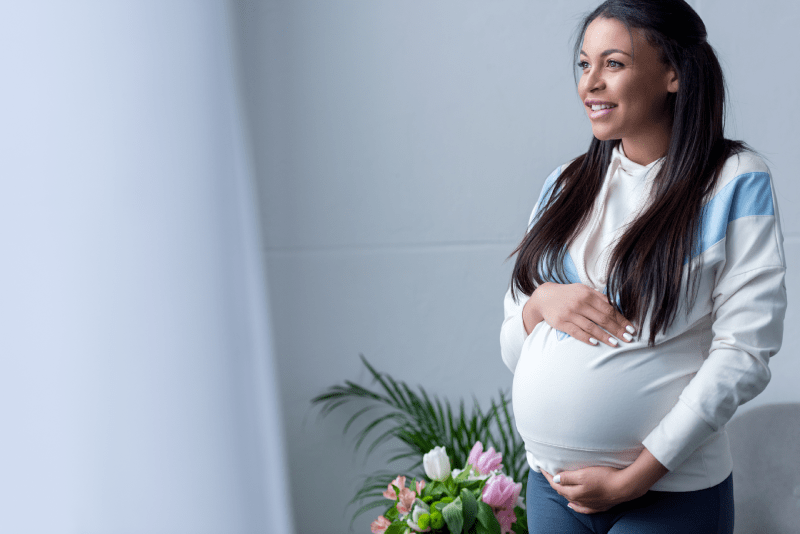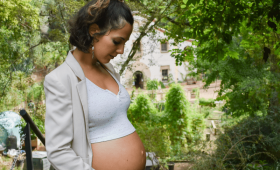How Many Months Is 13 Weeks of Pregnancy?
Your 13th week of pregnancy marks the end of your third month and signifies the end of the first trimester. This week is the beginning of your transition into the second trimester, a more comfortable period often referred to as the “honeymoon phase.”
You are entering a stage where complaints you may have experienced during the first three months, such as nausea, fatigue, and mood swings, will gradually begin to subside. This period offers a wonderful opportunity to experience your pregnancy in a more enjoyable and energetic way. Your pregnancy is now in a safer phase, which often brings a sense of relief and a chance to truly enjoy the journey ahead.
What Changes Does the Expectant Mother’s Body Experience in the 13th Week?
In this week, the expectant mother’s body continues to undergo significant changes. As hormone levels become more stable, the common first-trimester symptoms of morning sickness and fatigue usually start to diminish.
The uterus now begins to rise out of the pelvic cavity, so you might feel a slight bulge and fullness in your abdomen. Some expectant mothers notice that they can breathe more easily during this period and their appetite has returned. It’s also common to observe a noticeable glow in the skin and a fuller appearance in the hair, which are often cited as the benefits of being pregnant.
What Is the Status of the Baby’s Development in the 13th Week?
In the 13th week of pregnancy, your baby’s development is quite rapid. It is now approximately 7-8 cm long and weighs about 25 grams. All of its major organs and external body structures are now formed and continue to develop their functions.
Your baby’s facial features have become more distinct, and its fingerprints have started to form. The larynx and vocal cords are also developing, laying the foundation for future cries. Your baby moves, kicks, and stretches inside the amniotic fluid, but these movements are still too small to be felt by you.
What Should Nutrition Be Like During Pregnancy?
With your appetite returning this week, it is important to focus more on a balanced and healthy diet. You should pay attention to your intake of calcium (milk, yogurt, cheese) for your baby’s bone development, Omega-3 fatty acids (salmon, walnuts) for brain development, and iron (red meat, spinach) for red blood cells. Drinking plenty of water is of critical importance for the health of your digestive system. Consuming fibrous foods will help alleviate the constipation that is often encountered during this period, ensuring you stay comfortable.
What Are the Common Complaints During Pregnancy?
While complaints like nausea and fatigue may decrease in the 13th week, new complaints might emerge. The most common complaints during this period include constipation, heartburn, and headaches. Due to hormones, the digestive system can slow down, leading to constipation. Increased blood volume and hormonal changes can trigger headaches. Heartburn can be caused by the pressure of the growing uterus on the stomach. It is recommended that you pay attention to your nutrition and consume plenty of fluids to manage these complaints.

When Is the Baby’s Gender Determined?
The 13th week is a period when the formation of the baby’s external sex organs begins, but these organs cannot yet be clearly seen with an ultrasound. To determine the gender with an ultrasound, scans are usually waited for after the 16th week. Factors such as the baby’s position and the quality of the ultrasound can affect when the gender will be determined. Therefore, it is recommended that you be patient and wait for your next check-up appointment. The excitement of finding out your baby’s gender will make this period of your pregnancy even more special.
What Tests Are Done During the 13th Week of Pregnancy?
In the 13th week of pregnancy, a nuchal translucency (NT) scan is usually performed. This test measures the fluid accumulation in the baby’s neck area and helps to evaluate the risk of chromosomal abnormalities such as Down syndrome. In addition, a double test may also be done during this period. These tests provide you with important information about your baby’s health. The test results help to determine whether more detailed tests are needed in the future, providing a clearer picture of your baby’s well-being.
Can I Exercise During Pregnancy?
Starting or continuing with light and regular exercises is safe from the 13th week of pregnancy. Exercises such as walking, prenatal yoga, swimming, and pilates improve blood circulation, alleviate back pain, and increase your stamina for labor. However, it is important to consult a professional before starting any exercise program. You should listen to your body, avoid over-exertion, and stay away from movements that could disrupt your balance. Be sure to drink plenty of water during exercise to stay hydrated.
When Does the Pregnancy Belly Become Noticeable?
The prominence of the pregnancy belly varies from person to person. For first-time mothers, the belly usually starts to become more noticeable around the 13th week and thereafter. In women who have given birth before, the belly may become prominent earlier. The main reason for your belly’s growth this week is that the uterus is rising out of the pelvis. This may indicate a need for more comfortable clothing that can accommodate your changing shape.
Do Nausea and Fatigue Decrease?
Yes, the 13th week is a period when the most challenging symptoms of the first trimester, such as morning sickness and extreme fatigue, typically decrease. Your hormone levels have now reached a more stable level, and your body has adapted better to the pregnancy. This is a source of relief for many expectant mothers and is the most important sign that the second trimester, referred to as the “honeymoon period,” has begun.
Is Intercourse Safe During This Period?
In the 13th week of pregnancy, if your pregnancy is progressing normally and there are no special circumstances that your consultant has advised against, intercourse is completely safe. Your baby is protected in the uterus by strong uterine muscles and amniotic fluid. This period can be a more enjoyable time for couples as complaints such as nausea and fatigue subside. However, you should be careful and stop immediately if you experience any pain, bleeding, or discomfort.
Can the Baby’s Movements Be Felt?
While your baby is actively moving in the 13th week of pregnancy, these movements are still too small to be felt. Most expectant mothers begin to feel the baby’s first movements (quickenings) between the 16th and 25th weeks, in the middle of the second trimester. These movements may initially feel like gas or muscle twitches, so you may not even recognize them at first.
How to Cope with Constipation?
The digestive system, which slows down due to the effect of hormones, is a common complaint in the 13th week. To prevent and alleviate constipation, be sure to consume fibrous foods (fruits, vegetables, whole grain products). Drinking at least 8-10 glasses of water a day and doing light exercises like regular walking also help your digestive system work more regularly. If necessary, you can use a safe supplement after consulting with your specialist.
Should I Pay Attention to Dental Health?
During pregnancy, it is very important to pay extra attention to your dental and gum health. High hormone levels can cause your gums to swell and bleed more easily. Some expectant mothers may develop a condition known as pregnancy gingivitis. You should continue regular brushing and flossing and not neglect your regular dental check-ups. Your dental health is an indicator of your overall health and the health of your baby.
Does Frequent Urination Continue?
Frequent urination is a common complaint in the first months of pregnancy. In the 13th week, as the uterus grows upwards, the pressure on the bladder may temporarily ease, and this complaint may decrease. However, as the pregnancy progresses, this will reappear as the uterus puts pressure on the bladder again. Therefore, you should continue to consume plenty of fluids and not delay the need to go to the toilet.
Are There Emotional Changes This Week?
Unlike the emotional fluctuations of the first trimester, your mood may become more stable by the 13th week. Hormones are now more balanced, and you may feel better and more energetic. However, this does not mean that anxieties will completely disappear. New roles related to motherhood, responsibilities, and thoughts about the future can trigger new emotional changes. Taking good care of yourself and sharing your feelings will help you get through this process more easily.
How Is Pregnancy Weight Gain Managed?
From the 13th week on, regular weight gain begins. For a healthy pregnancy, an average weekly weight gain of about 0.5 kg is expected. This weight gain is due to factors such as the baby’s growth, amniotic fluid, and the placenta. To control weight gain, you should continue to eat a balanced diet and not skip meals. Excessive or insufficient weight gain can negatively affect the health of both you and your baby.
What Vitamins and Minerals Should Be Taken?
From the 13th week of pregnancy, more vitamins and minerals are needed for your baby’s development. You should regularly use the supplements recommended by your consultant. Folic acid is still important for the development of the nervous system. Iron is a critical mineral for increasing your blood volume and reducing the risk of anemia. Calcium and Vitamin D are also vital for your baby’s bone and tooth development.
Should I Switch to Maternity Clothes?
In the 13th week, as your belly grows, your normal clothes may start to feel uncomfortable. This is a great time to switch to maternity clothes. Maternity pants, leggings, and tops made from flexible fabrics allow you to be comfortable without restricting your movements during this period. As your belly will continue to grow, you should make sure your clothes are flexible and comfortable.

Is It Safe to Travel?
The 13th week of pregnancy is generally considered one of the safest periods for travel. With a decrease in complaints such as morning sickness and fatigue, traveling can become more enjoyable. During long plane or car trips, it is important to take breaks at regular intervals, walk around, and stretch your legs. You should always have water and healthy snacks with you. For a relaxing trip, you can get support from a company like Cure Holiday.
What Are the Skin Changes in Pregnancy?
Increased blood volume and hormone levels in pregnancy can cause some changes in your skin. A radiant complexion, known as the “pregnancy glow,” is commonly seen this week. Some expectant mothers may also experience an increase in acne or pigmentation problems such as melasma (the mask of pregnancy). Keeping your skin clean and moisturized, using sunscreen, and eating a balanced diet will help you cope with these changes.
What Helps with Heartburn?
Heartburn is a complaint that can be seen throughout pregnancy. It can also appear this week. To reduce heartburn, eat your meals slowly and chew well. Avoid fatty, spicy, and acidic foods. Instead of lying down immediately after meals, stay in an upright position for a while. Keeping your head slightly elevated while lying down can also prevent stomach acid from escaping. Eating frequent, small portions will also be beneficial.
How to Share the Pregnancy News with Family and Friends?
The 13th week of pregnancy is a great time to share the good news with your close circle, as the first trimester has ended and the pregnancy has entered a safer stage. Many couples wait for this period, when the risk of miscarriage is significantly reduced. The way you announce the news is completely up to you; you can share this special moment with your loved ones in creative and fun ways.
Is It Possible to Continue Working?
If your pregnancy is progressing normally, there is no obstacle to you continuing your work life. With the decrease in morning sickness and an increase in your energy, it may become easier to focus on work. However, if your job involves heavy lifting, exposure to dangerous substances, or standing for long periods, you should consult with your employer or a professional to ensure necessary adjustments are made.
When Does Back Pain Start?
While back and lower back pain are generally more common in the second half of pregnancy, they can also start in the 13th week for some expectant mothers. This is due to the growth of the uterus and the shift in the body’s center of gravity. To prevent pain, pay attention to correct posture, avoid heavy lifting, and regularly do exercises that strengthen your back muscles. Your choice of shoes is also important in this regard; you should prefer comfortable, flat shoes instead of heels.
What Are the Danger Signs of Pregnancy?
Even if your pregnancy is progressing normally, it is important to pay attention to some danger signs. If you observe symptoms such as vaginal bleeding, severe cramps or abdominal pain, sudden fluid discharge, or severe dizziness in the 13th week, you should seek immediate help. These symptoms may be a sign of serious conditions that require early intervention. Remember that early diagnosis always offers a more effective solution.
What Is the Importance of Sufficient Sleep in Pregnancy?
Sufficient sleep is very important for the health of both you and your baby. Despite your increased energy levels this week, you should aim to get at least 8-10 hours of sleep per night. A good night’s sleep will help you feel better both physically and mentally. Taking short naps during the day can also help you recharge your energy. If you have trouble sleeping, establishing a sleep routine and sleeping in a comfortable environment will be beneficial.
Do Pets Affect Pregnancy?
Your relationship with your pet should continue during pregnancy, but it is important to take some precautions. Cat owners, in particular, should have someone else clean the cat’s litter box due to the risk of toxoplasmosis. This parasite is found in cat feces and can harm the baby during pregnancy. If you have to do the cleaning yourself, be sure to wear gloves and wash your hands well. It is also important to wash your hands after playing with all pets and to follow general hygiene rules.
Is the 13th Week Different in a Twin Pregnancy?
In a twin pregnancy, the 13th week can be slightly different from a singleton pregnancy. As hormone levels are higher, complaints such as nausea and fatigue may be experienced more intensely. The size of your belly may be more prominent, and you may need to switch to maternity clothes earlier. Since twin pregnancies require closer monitoring, check-up appointments may be more frequent. Resting and eating well during this period is vital for the health of both you and your babies.
When Does the First Trimester of Pregnancy End?
The first trimester of pregnancy ends at the end of the 12th week, and the second trimester begins with the 13th week. This means that the most sensitive period of pregnancy, organ formation, is largely complete. The risk of miscarriage decreases significantly from this week on, which is a great source of relief for many expectant mothers. You are now entering a safer and more enjoyable phase of your pregnancy.
Does Morning Sickness Come Back?
Morning sickness usually decreases with the end of the first trimester and does not often come back. However, in some expectant mothers, certain smells or foods can still trigger nausea. Hormonal fluctuations or stressful situations can also cause a feeling of nausea from time to time. If your nausea worsens instead of decreasing or causes weight loss, it is important to discuss this with your consultant.
What Should Salt Consumption Be Like?
Salt consumption during pregnancy should be controlled as it can increase the risk of swelling (edema) and high blood pressure. It is important to avoid overly salty, processed, and ready-made foods. To reduce your sodium intake, you can add spices and herbs to your meals instead of salt. Drinking plenty of water to balance your salt intake helps your body excrete excess salt and can reduce the formation of edema.
Varicose Vein Problems Seen in Pregnancy
Varicose veins can form due to the increased blood volume in pregnancy and the pressure of the growing uterus on the veins. This can cause a feeling of heaviness and pain in the legs. To prevent varicose veins, avoid standing for long periods, rest by lifting your legs up frequently, and prefer comfortable shoes. Regular walking and applying cold water to your legs can also reduce the formation of varicose veins.
Is Medication Use Safe During Pregnancy?
You should always consult with a specialist before using any medication during pregnancy. The first three months of pregnancy are the most sensitive period when the baby’s organs are forming, but some medications can still harm the baby after the 13th week. Therefore, you should not use any medication, supplement, or herbal product, including over-the-counter ones, without consulting a specialist. It is important to seek professional help for the correct treatment of any complaints you may have.

Why Is the Second Trimester Called the Honeymoon Period of Pregnancy?
The second trimester is often called the “honeymoon period” of pregnancy because the difficult complaints of the first trimester, such as morning sickness, fatigue, and breast tenderness, begin to decrease during this period. Expectant mothers feel more energetic and joyful. Baby movements begin to be felt, and the pregnancy becomes a more tangible reality. This period is one of the most physically and emotionally comfortable and enjoyable stages. It’s a great time to make vacation plans, travel, and spend quality time with your partner.
Is It Possible to Plan a Peaceful Vacation with Cure Holiday?
The 13th week of pregnancy is one of the most ideal periods for travel. The decrease in morning sickness and the increase in energy offer a perfect opportunity for a relaxing vacation. Cure Holiday offers calm and safe vacation options specially designed for your pregnancy. Holiday packages full of prenatal massages, relaxing activities, and healthy eating options will help you relax both physically and mentally. You can contact Cure Holiday to plan a vacation tailored to your needs.
What Is the Feeling of First-Time Motherhood Like?
In the 13th week of pregnancy, the feeling of motherhood becomes more pronounced. Your baby’s growth and the changes in your abdominal area make you feel its presence more concretely. During this period, first-time mothers may experience complex emotions such as both excitement and anxiety. Talking to your baby, touching your belly, and dreaming about your baby will help strengthen the mother-baby bond. Do not feel alone on this emotional journey and do not hesitate to share your feelings with loved ones.



